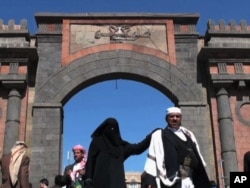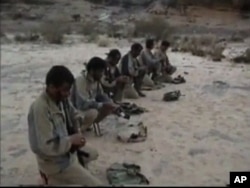Yemen is on the southern end of the Arabian peninsula and is the poorest nation in the Arab World. "Yemen has an unemployment rate of about 35 percent," says National Defense University's April Alley. "Over 45 percent of the population lives below the poverty line."
Worse yet, Yemen is running out of oil, its major source of revenue.
James Larocco, is with the Near East South Asia Center for Strategic Studies. "By all accounts their oil will run out within 7 years. And Sanaa could be the first capital in the world to run out of water."
"The country is facing serious economic, social, environmental problems," says Edmund Ghareeb of American University.
For hundreds of years, Yemen was actually two countries, according to analysts, with regions with significant cultural, political and religious differences. Former North Yemen leader Ali Abdullah Saleh has been the president of a united Yemen since a brief civil war ended in 1994. But Saleh has little control over the country outside of the capital, Sanaa.
April Alley says of the Yemeni government: "Saleh is facing two main pockets of domestic unrest. The first is the Houthi rebellion in the north and the second is the southern movement in the south."
The Houthi rebellion broke out in 2004 and intensified after Yemen's army launched its "Scorched Earth" operation, killing hundreds and displacing tens of thousands of people. James Larocco says Houthi rebels say they have been discriminated against by the government.
In Yemen's south there is a major secessionist movement. Yemenis in the south say Saleh's government is dominated by northerners who are pillaging southern resources, especially oil.
April Alley says, "One of the complaints of the southerners is that northerners are basically stealing, confiscating their wealth and using it for networks of corruption in the north."
Adding to the troubles are Yemen's high unemployment rate, runaway population growth and widespread poverty. Analyst April Alley says that Yemen must be considered a failing state.
"If you're considering a failed state to be a state that cannot secure its borders, cannot control its territory, or provide a modicum of services to its population - indeed Yemen is a failing state."
American University's Edmnud Ghareeb says Yemen's socio-economic conditions make it ripe for exploitation for terror groups such as al-Qaida. "al-Qaida has succeeded in recruiting some Yemenis," he says.
The United States is providing substantial military and intelligence support to Yemen in the fight against terrorism. Al-Qaida is operating in Yemen, and critics say President Saleh is using his fight against that terror group to crush internal political dissent - another reason this small country in the Middle East is drawing attention.
You can watch this, and all of Todd's "Now You Know" reports here.








